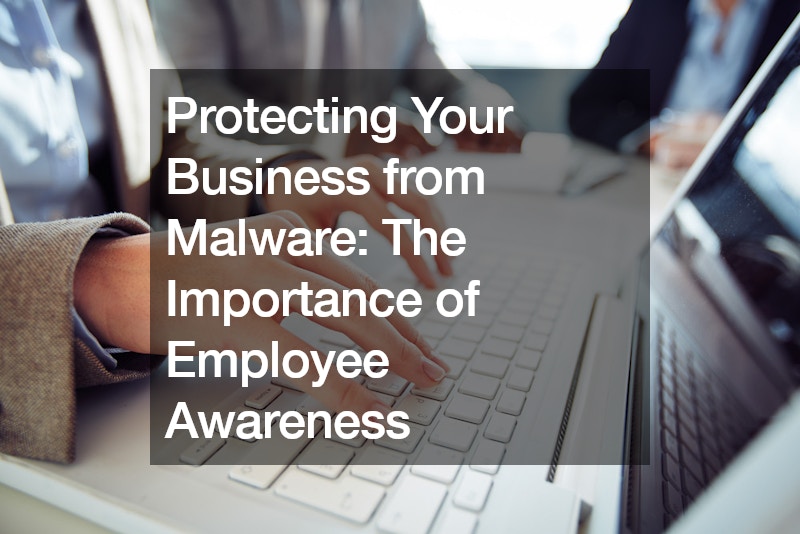In today’s digital age, businesses rely heavily on their computer systems to operate efficiently. However, these systems are constantly under threat from malicious software, or malware. Malware can cause significant disruption, data breaches, and financial losses. While robust technical defenses are crucial, a critical component of any effective cybersecurity strategy is employee awareness. Here’s why educating your staff about malware is the first line of defense in protecting your business.
What is Malware and How Does it Work?
Malware is any software program designed to infiltrate and harm a computer system. It often disguises itself as legitimate software, tricking users into downloading and installing it. Once installed, malware can steal sensitive data, lock your files and demand a ransom (ransomware), disrupt operations, or even grant attackers remote control of your systems.
There are several ways malware can infiltrate a system. Phishing emails, which appear to be from legitimate sources like banks or colleagues, often contain malicious attachments or links that, when clicked, download malware. Unsecured websites can also host malware that automatically infects computers that visit the site. Additionally, malware can be hidden within seemingly harmless software downloads, especially from unofficial sources.
The Devastating Impact of Malware Attacks
A successful malware attack can have a devastating impact on your business. Here are some of the potential consequences:
- Data breaches: Malware can steal sensitive customer and employee data, including credit card numbers, social security numbers, and confidential business information. This can lead to financial losses, regulatory fines, and reputational damage.
- Disrupted operations: Malware can disrupt critical business processes, leading to downtime, productivity losses, and customer dissatisfaction.
- Financial losses: Businesses may be forced to pay ransom demands, invest in data recovery efforts, and repair damaged systems after a malware attack.
- Reputational damage: A malware attack can erode customer trust and damage your business reputation.
Why Employee Awareness is Crucial
While technical safeguards like firewalls and antivirus software are essential, they are not foolproof. Cybercriminals are constantly developing new and sophisticated malware that can bypass traditional defenses. This is where employee awareness comes in.
Educated employees become a vital defense against malware attacks. They can recognize suspicious emails, avoid clicking on malicious links, and be cautious about downloading software from unverified sources. By understanding the tactics used by cybercriminals, employees can significantly reduce the risk of malware infection.
Building a Culture of Cybersecurity Awareness
Here are some key steps to build a culture of cybersecurity awareness among your employees:
- Regular Security Training: Conduct regular cybersecurity training sessions for all employees. These sessions should educate employees on different types of malware, common attack tactics, and best practices for safe online behavior. Training should be engaging and interactive, incorporating real-world examples and scenarios.
- Phishing Simulation Exercises: Regularly conduct simulated phishing attacks to test your employees’ ability to identify suspicious emails. This will help them learn to spot the red flags and avoid falling victim to real phishing attempts.
- Clear Security Policies: Develop and implement clear security policies that outline acceptable computer usage and internet browsing practices. This includes policies on password management, software downloads, and email usage.
- Open Communication: Encourage an open communication environment where employees can report suspicious activity without fear of reprisal. This will create a culture of vigilance and allow you to address potential threats quickly.
- Ongoing Updates: The cybersecurity landscape is constantly evolving. It’s essential to keep your employees updated on the latest threats and attack tactics. Regular security briefings and newsletters can help achieve this.
Leveraging IT Support Services
Building and maintaining a robust cybersecurity program requires ongoing effort. Many businesses don’t have the in-house expertise or resources to manage their cybersecurity needs effectively. Partnering with a reputable IT support service provider can be a strategic solution. These providers can offer a range of services, including:
- Vulnerability Assessments: IT support services can conduct regular vulnerability assessments to identify weaknesses in your network security.
- Security Software Management: They can handle the installation, configuration, and maintenance of security software like firewalls and antivirus solutions.
- Incident Response Planning: They can help you develop a comprehensive incident response plan that outlines the steps to take in case of a malware attack.
- Ongoing Security Monitoring: Many IT support services offer 24/7 security monitoring to detect and respond to potential threats in real-time.
By partnering with an IT support service, you can leverage their expertise to strengthen your cybersecurity defenses, freeing up your internal resources to focus on core business activities.
Conclusion
Cybersecurity is an ongoing battle, but with a combination of robust technical measures and a strong culture of employee awareness, you can significantly reduce the risk of malware attacks. By educating your staff and equipping them with the knowledge to identify and avoid threats, you create a human firewall that complements your technological defenses. Remember, a single click on a malicious link by an unsuspecting employee can have devastating consequences. Invest in employee awareness training, build a culture of cybersecurity vigilance, and consider partnering with an IT support service provider to fortify your defenses. By taking these proactive steps, you can protect your business from the ever-present threat of malware attacks and ensure the smooth operation and continued success of your organization.
.







